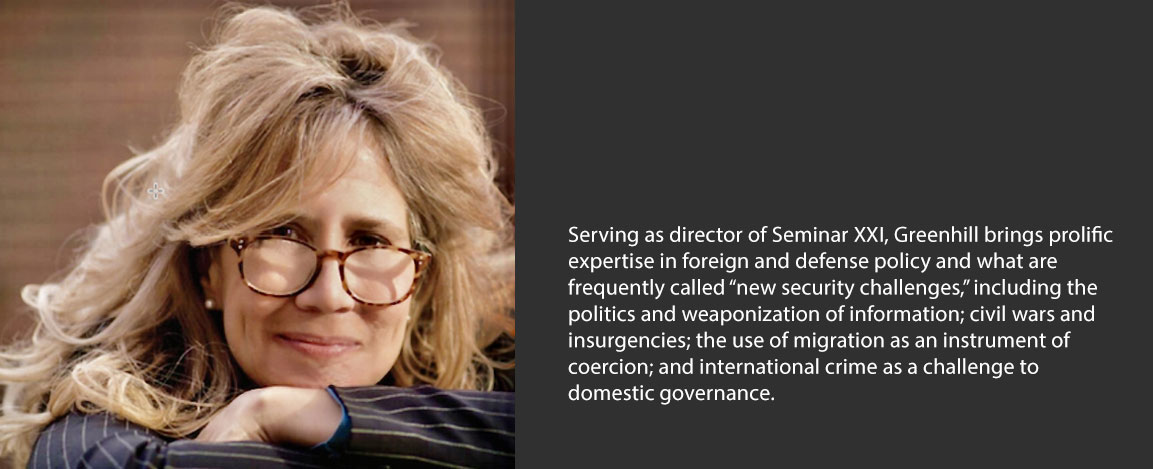A post-graduate education program, Seminar XXI links policymaking and academia by bringing together military and civilian executives with scholars from MIT and beyond.
Kelly M Greenhill, 2020-21 Leverhulme Trust Visiting Professor (SOAS University of London) and associate professor of political science at Tufts University, joins CIS as director of the Seminar XXI Program. She will also serve as a visiting professor at MIT, a senior research fellow at the MIT Security Studies Program (SSP), and as a research associate at Harvard Kennedy School’s Belfer Center.
Greenhill received her PhD from the MIT Department of Political Science in 2004 and is a member of the MIT Security Studies Program. She is a Seminar XXI veteran and has long served on its executive board.
Seminar XXI is one of the most successful and competitive post-graduate education programs in the national security arena. It links policymaking and academia by bringing together military and civilian executives with scholars from MIT and beyond.
Since its inception as an MIT program in 1986, Seminar XXI has inspired its graduates to apply the compelling insights of social science to the most pressing challenges of our times. It currently boasts more than 2,500 alumni, who serve or have served in high-ranking positions in government, including the CIA, the US Department of State, and the US Department of Defense.
“We are delighted that our colleague, Kelly Greenhill, has taken on the responsibilities of Seminar XXI faculty director. I can think of no scholar more able or experienced to lead this important program in its fourth decade,” said Richard Samuels, Ford International Professor of Political Science and director of the Center for International Studies (CIS).
Serving as director of Seminar XXI, Greenhill brings prolific expertise in foreign and defense policy and what are frequently called “new security challenges,” including the politics and weaponization of information; civil wars and insurgencies; the use of migration as an instrument of coercion; and international crime as a challenge to domestic governance.
She has written articles for the academic journals International Security, Security Studies, Civil Wars and International Studies Quarterly, among others, as well as for the New York Times, Foreign Affairs, the Los Angeles Times, the Washington Post, and the BBC.
Her book Weapons of Mass Migration: Forced Displacement, Coercion and Foreign Policy was the 2011 winner of the International Studies Association’s Best Book of the Year Award and has been published in whole or in part in six languages. Her co-edited books include: The Use of Force: Military Power and International Politics; and Sex, Drugs, and Body Counts: The Politics of Numbers in Global Crime and Conflict.
“I look forward to building upon the innumerable accomplishments of previous directors, while also stretching the program’s analytical aperture in some areas. This dual approach should permit Seminar XXI to continue to do what it does best, while also incorporating a broader and more diverse array of perspectives and prescriptions. With the assistance of the program’s enormously talented and capable staff, I also hope to further amplify the influence and extend the reach of Seminar XXI through greater engagement with, and utilization of, its ever-expanding alumni network—both fellows and veteran faculty. After more than 35 years, our community represents a rich, deep, and enormously wide-ranging resource.”
The world has changed dramatically since the program’s inception, as have many of the challenges facing our nation. But while topics and regions of focus have shifted, the program’s core mission has remained constant: to help educate senior leaders in our country’s national security sphere by bringing to them the best of social science theory and historical perspective, explains Greenhill.
Becoming the next director of Seminar XXI represents both a new journey and a homecoming for Greenhill. “I will return, in an exciting, new role, not only to the Institution where I earned master’s and doctoral degrees, but also to the program that inspired the research question at the heart of my first book, and where I cut my teeth and earned my initial stripes as a manager and higher-education administrator. I am likewise excited to be resuming an active role as a member of the broader CIS and SSP community. I look forward to spending time with, and learning from, old friends and colleagues and to meeting new ones in the environment that has played such a formative role in my personal and professional development.”



